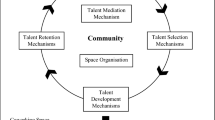Abstract
Third places and creative hubs (Virani and Malem 2015; Dovey et al. 2016) such as coworking spaces, business incubators and fablabs represent new forms of collaborative working practices that have emerged along with the rise of the creative economy and the sharing economy paradigms. Workers in third places share office space, technology, information, and also they can socialize, form social bonds and professional relationships, as coworking spaces facilitate encounters and interaction through the spatial proximity of the co-workers.
Access this chapter
Tax calculation will be finalised at checkout
Purchases are for personal use only
Similar content being viewed by others
References
Avdikos, V., & Kalogeresis, A. (2017). Socio-economic profile and working conditions of freelancers in co-working spaces and work collectives: Evidence from the design sector in Greece. Area,49(1), 35–42.
Bailey, S., & Marcucci, M. E. (2013). Legalizing the occupation: The Teatro Valle as a cultural commons. South Atlantic Quarterly,112(2), 396–405.
Boschma, R. A. (2005). Proximity and innovation: A critical assessment. Regional Studies,39, 61–74.
Bender, D. (2013). Mobile Arbeitsplätze als kreative Räume: Coworking Spaces, Cafés und andere urbane Arbeitsorte. Bielefeld: Transcript Verlag.
Butcher, T. (2016). Co-working communities: Sustainability citizenship at work. In Sustainability Citizenship in Cities (pp. 113–123). Routledge.
Capdevila, I. (2015). Co-working spaces and the localised dynamics of innovation in Barcelona. International Journal of Innovation Management, 19(03), 1540004.
DeGuzman, G. V., & Tang, A. I. (2011). Working in the unoffice: A guide to coworking for indie workers, small businesses, and nonprofits. San Francisco: Night Owls Press LLC.
de Peuter, G., & Cohen, N. S. (2015). Emerging labour politics in creative industries. In K. Oakley & J. O’ Connor (Eds.), The Routledge companion to the cultural industries (pp. 305–318). Abingdon: Routledge.
Dovey, J., Pratt, A. C., Moreton, S., Virani, T. E., Merkel, J., & Lansdowne, J. (2016). The Creative Hubs Report: 2016.
Freelancers Europe. (2014). European freelancers movement 2014. Available at http://freelancers-europe.org/.
Gandini, A. (2015). The rise of coworking spaces: A literature review. Ephemera, 15(1), 193–205.
Gill, R. (2002). Cool, creative and egalitarian? Exploring gender in project-based new media work in Euro. Information, Communication & Society,5(1), 70–89.
Kong, L. (2009). Beyond networks and relations: Towards rethinking creative cluster theory. In Creative Economies, Creative Cities (pp. 61–75). Dordrecht: Springer.
Kong, L. (2011). From precarious labor to precarious economy? Planning for precarity in Singapore’s creative economy. City, Culture and Society,2(2), 55–64.
Marshall, A. (1920 [2009]). Principles of economics (Rev. ed.). London: Macmillan. Reprinted by Prometheus Books.
Merkel, J. (2015). Coworking in the city. Ephemera: Theory & Politics in Organization, 15(1), 121–139.
Moriset, B. (2013). Building new places of the creative economy. The rise of coworking spaces. Available at halshs-00914075.
Moriset, B. (2014, January). Building new places of the creative economy. The rise of coworking spaces. Paper presented at the 2nd Geography of Innovation International Conference 2014 (pp. 23–25), Utrecht, Netherlands.
Parrino, L. (2015). Coworking: Assessing the role of proximity in knowledge exchange. Knowledge Management Research & Practice,13(3), 261–271.
Spinuzzi, C. (2012). Working alone together: Coworking as emergent collaborative activity. Journal of Business and Technical Communication,26(4), 399–441. https://doi.org/10.1177/1050651912444070.
Sundsted, T., Jones, D., & Bacigalupo, T. (2009). I’m Outta here: How co-working is making the office obsolete. Brooklyn and Austin: Not an MBA Press.
Virani, T. E., & Malem, W. (2015). Re-articulating the creative hub concept as a model for business support in the local creative economy: The case of Mare Street in Hackney (Creativeworks London Working Paper Series).
Zukin, S. (1989). Loft living: Culture and capital in urban change. Baltimore: Johns Hopkins University Press.
Author information
Authors and Affiliations
Editor information
Editors and Affiliations
Rights and permissions
Copyright information
© 2019 The Author(s)
About this chapter
Cite this chapter
Avdikos, V., Iliopoulou, E. (2019). Community-Led Coworking Spaces: From Co-location to Collaboration and Collectivization. In: Gill, R., Pratt, A.C., Virani, T.E. (eds) Creative Hubs in Question. Dynamics of Virtual Work. Palgrave Macmillan, Cham. https://doi.org/10.1007/978-3-030-10653-9_6
Download citation
DOI: https://doi.org/10.1007/978-3-030-10653-9_6
Published:
Publisher Name: Palgrave Macmillan, Cham
Print ISBN: 978-3-030-10652-2
Online ISBN: 978-3-030-10653-9
eBook Packages: Social SciencesSocial Sciences (R0)




